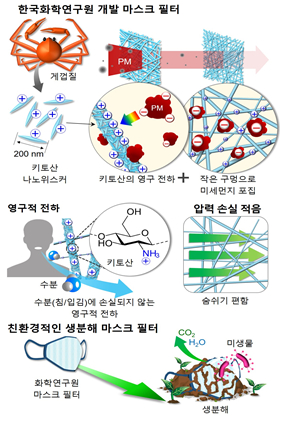![An overview of making eco-friendly mask filters. [사진 한국화학연구원]](https://i0.wp.com/pds.joins.com/news/component/htmlphoto_mmdata/202103/23/ef00cc04-7443-4ad4-b7ea-26bfd01e4a8b.jpg?w=560&ssl=1)
An overview of making eco-friendly mask filters. [사진 한국화학연구원]
The cover paper of the international academic journal’Advanced Science’ on the 17th
Researchers in Korea have developed a biodegradable mask filter that is 100% biodegradable, easy to breathe, and can be reused many times.
According to the city of Ulsan on the 23rd, the research team of Hwang Seong-yeon, director of the Biochemical Research Center at the Korea Research Institute of Chemical Technology, developed a new concept biodegradable mask filter with N95 performance that is 100% biodegradable under composting conditions within one month.
After the novel coronavirus infection (Corona 19), a mask that blocks the virus has become a necessity for life. However, most of the materials that make up the mask are difficult to disassemble and recycle, causing environmental pollution problems. In particular, the filter is made of polypropylene, such as a plastic straw material, so it does not rot in the soil.
The research team said, “We used polybutylene succinate (PBS), a representative biodegradable plastic, to make a filter by making it strong with our own technology.” First, the supplemented PBS is pulled out in the form of fine nanofibers and microfibers, and then the fibers are stacked to form a nonwoven fabric.
The research team then extracted chitosan nanowhiskers from the shells of crabs and coated them on nonwoven fabrics. A waste decomposition test with the filter made in this way showed that it naturally biodegrades within 28 days in composted soil.
The research team said, “This filter shows a similar level of blocking effect as KF94, the Korean standard,” and said, “The filter satisfies the US mask standard N95 (blocking 95% of 0.3㎛ size particles).” KF94, a Korean mask standard, should block 94% of 0.4㎛ size particles.
In particular, this mask filter was found to be reusable and comfortable to breathe than the KF94 mask because it differs from the existing filters in manufacturing method. Most of the products on the market adopt one of the electrostatic filter method and the method of physically filtering particles like a sieve. The electrostatic method has a problem that it is difficult to repeatedly use for a long time because it is vulnerable to moisture, and the sieve method has a limitation that it is difficult to breathe.
This filter uses the principle of charge rather than static electricity to filter out foreign matter. The chitosan nanowhisker, a coating component, has a positive electrode (positive charge), and external substances such as viruses and fine dust usually have a negative charge (negative charge), and catches the foreign substance in the filter as if a magnet is attracted. The research team explained that the filter made with this principle is resistant to moisture, so it can be used multiple times and is more comfortable to breathe.
The research results were published as a cover paper in the international academic journal’Advanced Science’ on the 17th. In addition to the filter, the research team is currently pursuing research that can replace all parts of the mask with biodegradable materials, such as a wire for fixing the nose, a link to prevent loosening of the mask, and a rubber band.
Director Hwang Seong-yeon said, “The results of this study are close to idea patents because they applied technology owned in Korea.”
Ulsan = Reporter Baek Kyungseo [email protected]
![]()
